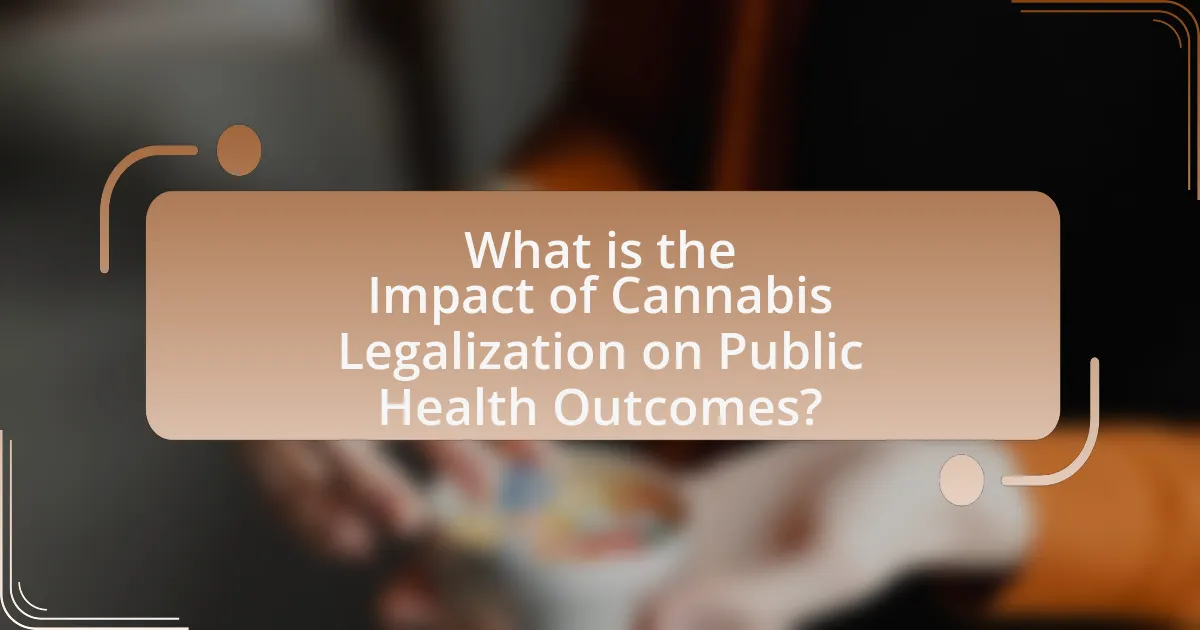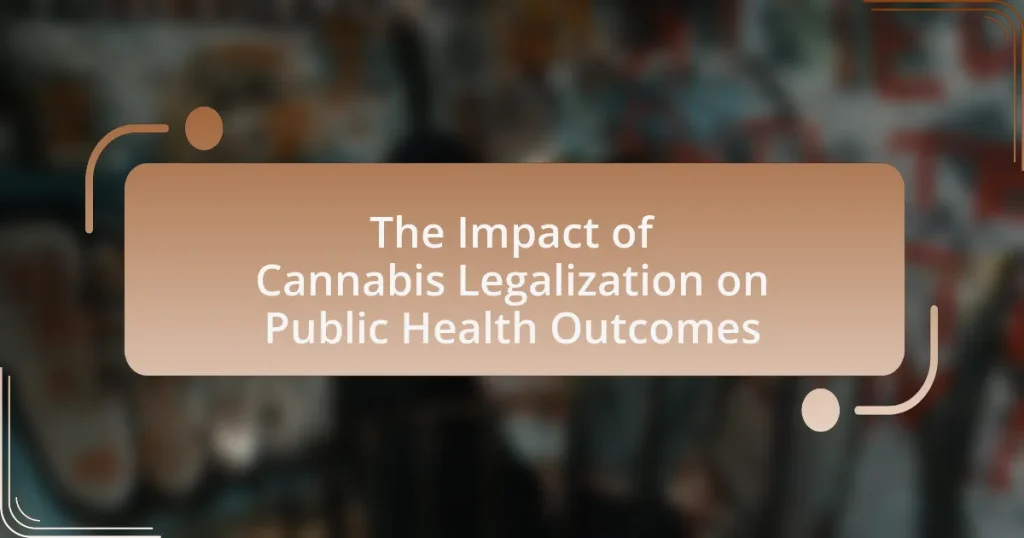The article examines the impact of cannabis legalization on public health outcomes, highlighting both positive and negative implications for mental and physical health. Key findings indicate that legalization can improve access to medicinal cannabis, potentially reducing opioid overdose deaths, while also raising concerns about increased cannabis use among adolescents and associated mental health issues. The article further explores how different legalization models influence health outcomes, the role of education in shaping public perceptions, and the economic implications of cannabis-related healthcare savings. Additionally, it discusses strategies for public health officials to mitigate risks and promote safe consumption practices following legalization.

What is the Impact of Cannabis Legalization on Public Health Outcomes?
Cannabis legalization has a multifaceted impact on public health outcomes, primarily influencing both mental and physical health. Research indicates that legalization can lead to increased access to cannabis for medicinal purposes, which may benefit patients with chronic pain, epilepsy, and other conditions. A study published in the Journal of Health Economics found that states with legalized medical cannabis experienced a 25% reduction in opioid overdose deaths, suggesting a potential substitution effect between opioids and cannabis.
Conversely, cannabis legalization may also result in increased rates of cannabis use, particularly among adolescents, which raises concerns about mental health issues such as anxiety and depression. The National Institute on Drug Abuse reported that states with legalized recreational cannabis saw a rise in cannabis use among youth, highlighting the need for effective public health strategies to mitigate potential risks.
Overall, the impact of cannabis legalization on public health outcomes is complex, with both positive and negative implications that require ongoing research and monitoring to fully understand.
How does cannabis legalization influence public health policies?
Cannabis legalization significantly influences public health policies by prompting the reevaluation of regulations surrounding substance use, health education, and resource allocation. As jurisdictions legalize cannabis, they often implement new frameworks for monitoring health outcomes, which can lead to improved data collection on cannabis use and its effects on public health. For instance, states like Colorado and Washington have established public health campaigns aimed at educating citizens about responsible cannabis use, thereby addressing potential health risks associated with consumption. Additionally, legalization can shift funding towards substance abuse treatment and prevention programs, as seen in California, where tax revenues from cannabis sales are allocated to mental health services and addiction treatment. This shift in policy not only reflects a change in societal attitudes towards cannabis but also aims to mitigate potential public health issues arising from its use.
What are the key public health outcomes affected by cannabis legalization?
Cannabis legalization significantly affects several key public health outcomes, including substance use patterns, mental health, and traffic safety. Research indicates that legalization often leads to increased cannabis use among adults, with a 2019 study published in the American Journal of Public Health showing a 20% increase in self-reported cannabis use in states that legalized recreational cannabis. Additionally, mental health outcomes can be impacted, as some studies suggest a correlation between increased cannabis use and higher rates of anxiety and depression, particularly among adolescents. Traffic safety is also a concern; a report from the Insurance Institute for Highway Safety found that states with legalized cannabis experienced a 6% increase in traffic fatalities, indicating potential risks associated with impaired driving. These outcomes highlight the complex public health implications of cannabis legalization.
How do different legalization models impact health outcomes?
Different legalization models significantly impact health outcomes by influencing access, consumption patterns, and public health resources. For instance, models that prioritize regulated markets, such as those in Canada and several U.S. states, have been associated with increased access to cannabis for medical use, leading to improved management of chronic pain and other health conditions. Research published in the Journal of Health Economics indicates that states with legalized medical cannabis report lower opioid overdose rates, suggesting a potential substitution effect where patients opt for cannabis over more harmful substances. Conversely, models that emphasize decriminalization without regulation may lead to increased consumption among youth and potential public health challenges, as seen in some jurisdictions where cannabis remains unregulated. Overall, the structure of legalization directly correlates with health outcomes, shaping both individual health behaviors and broader public health implications.
What are the potential benefits of cannabis legalization for public health?
Cannabis legalization can lead to several potential benefits for public health, including reduced opioid use, improved mental health outcomes, and increased access to medical cannabis for patients. Studies indicate that states with legalized cannabis have experienced a decrease in opioid prescriptions, suggesting that cannabis may serve as an alternative pain management option. For instance, a 2019 study published in the Journal of the American Medical Association found that states with medical cannabis laws had a 6.38% lower rate of opioid prescriptions compared to states without such laws. Additionally, cannabis has been shown to alleviate symptoms of anxiety and depression, contributing to better mental health for some individuals. Furthermore, legalization facilitates regulated access to cannabis for patients with qualifying conditions, ensuring safer consumption and reducing the risks associated with unregulated products.
How can cannabis legalization reduce opioid-related deaths?
Cannabis legalization can reduce opioid-related deaths by providing an alternative pain management option that is less addictive than opioids. Studies have shown that states with legalized cannabis have experienced a significant decrease in opioid prescriptions and related fatalities. For instance, a 2014 study published in JAMA Internal Medicine found that states with medical cannabis laws had a 25% lower rate of opioid overdose deaths compared to states without such laws. This suggests that access to cannabis may lead individuals to choose it over more dangerous opioid medications, thereby decreasing the overall incidence of opioid-related deaths.
What role does cannabis play in mental health treatment?
Cannabis plays a multifaceted role in mental health treatment, primarily as a potential therapeutic agent for conditions such as anxiety, depression, and PTSD. Research indicates that cannabinoids, particularly CBD, may help alleviate symptoms of these disorders by interacting with the endocannabinoid system, which regulates mood and stress responses. A study published in the Journal of Psychopharmacology found that CBD significantly reduced anxiety in participants during public speaking tasks, demonstrating its anxiolytic properties. Additionally, a review in the Journal of Affective Disorders highlighted that cannabis use is associated with reduced depressive symptoms in some individuals, although the effects can vary widely based on dosage and individual response.
What are the risks associated with cannabis legalization on public health?
Cannabis legalization poses several risks to public health, including increased rates of substance use disorders, impaired driving incidents, and potential mental health issues. Research indicates that states with legalized cannabis have seen a rise in cannabis use among adolescents, which can lead to long-term cognitive impairments and increased likelihood of developing mental health disorders such as anxiety and depression. Additionally, studies show that legalization correlates with higher rates of traffic accidents involving drivers under the influence of cannabis, raising concerns about road safety. Furthermore, the availability of cannabis may lead to increased consumption among vulnerable populations, exacerbating existing health disparities.
How does cannabis legalization affect youth usage rates?
Cannabis legalization generally leads to an increase in youth usage rates. Studies indicate that in states where cannabis has been legalized, there has been a notable rise in self-reported cannabis use among adolescents. For instance, a study published in the journal “JAMA Pediatrics” found that after legalization in Colorado, past-month cannabis use among high school students increased from 22.5% in 2011 to 28.5% in 2015. This trend suggests that legalization may reduce perceived risks associated with cannabis, thereby encouraging higher usage rates among youth.
What are the implications for respiratory health with increased cannabis use?
Increased cannabis use has significant implications for respiratory health, primarily due to the inhalation of smoke, which contains harmful substances. Research indicates that smoking cannabis can lead to respiratory issues such as chronic bronchitis, coughing, and wheezing, similar to the effects of tobacco smoke. A study published in the journal “Chest” found that regular cannabis smokers exhibited increased airway resistance and lung inflammation. Furthermore, the American Lung Association notes that cannabis smoke contains carcinogens and irritants that can adversely affect lung function over time. These findings underscore the potential risks associated with increased cannabis consumption and its impact on respiratory health.
How does cannabis legalization impact healthcare costs?
Cannabis legalization generally leads to a reduction in healthcare costs. Studies indicate that states with legalized cannabis have experienced lower prescription drug expenditures, particularly for pain management, as patients opt for cannabis over opioids. For instance, a study published in the Journal of Health Economics found that states with medical cannabis laws saw a 15% reduction in Medicare prescription drug spending. Additionally, cannabis can alleviate symptoms of various conditions, potentially decreasing the need for more expensive medical interventions. This evidence suggests that cannabis legalization can positively influence overall healthcare costs by reducing reliance on traditional pharmaceuticals and associated healthcare services.
What are the economic implications of cannabis-related healthcare savings?
Cannabis-related healthcare savings can lead to significant economic implications, primarily through reduced healthcare costs and increased tax revenue. Studies indicate that states with legalized cannabis have experienced lower prescription drug expenditures, with a 15% reduction in opioid prescriptions reported in states with medical cannabis laws. This reduction not only alleviates the financial burden on healthcare systems but also decreases the costs associated with opioid-related healthcare issues, such as addiction treatment and emergency services. Furthermore, the taxation of legal cannabis sales generates substantial revenue for state governments, which can be allocated to public health initiatives, education, and infrastructure. For example, Colorado reported over $1 billion in cannabis tax revenue since legalization, demonstrating a direct economic benefit from cannabis-related healthcare savings.
How do healthcare providers adapt to changes in cannabis laws?
Healthcare providers adapt to changes in cannabis laws by updating their clinical practices, educating themselves and their patients, and collaborating with legal and regulatory bodies. For instance, as states legalize cannabis for medical or recreational use, healthcare providers often revise treatment protocols to incorporate cannabis as a therapeutic option, ensuring they comply with new regulations. Additionally, they participate in continuing education programs to stay informed about the evolving legal landscape and the implications for patient care. Research indicates that healthcare providers who engage in these practices can better address patient inquiries and concerns regarding cannabis use, thereby improving patient outcomes and safety.
What are the social determinants of health related to cannabis legalization?
The social determinants of health related to cannabis legalization include socioeconomic status, access to healthcare, education, and community safety. These factors influence how individuals experience the effects of cannabis legalization, as those with higher socioeconomic status often have better access to health resources and education about cannabis use. Research indicates that communities with lower socioeconomic status may face increased health risks associated with cannabis use due to limited access to healthcare and preventive services. Additionally, education levels can affect understanding of cannabis effects and responsible use, while community safety impacts the overall health environment, influencing both usage patterns and health outcomes. For instance, a study published in the American Journal of Public Health found that cannabis legalization can lead to disparities in health outcomes based on these social determinants, highlighting the need for targeted public health interventions.
How does cannabis legalization affect marginalized communities?
Cannabis legalization positively affects marginalized communities by reducing incarceration rates and increasing economic opportunities. Studies indicate that states with legalized cannabis have seen a significant decrease in arrests for cannabis-related offenses, particularly among Black and Latino populations, who historically faced disproportionate enforcement. For example, a report from the American Civil Liberties Union (ACLU) found that Black individuals are 3.64 times more likely to be arrested for cannabis possession than white individuals, highlighting systemic racial disparities. Additionally, legalization creates job opportunities in cultivation, distribution, and retail sectors, which can benefit economically disadvantaged communities. A 2021 analysis by the Marijuana Policy Project showed that legal cannabis markets can generate substantial tax revenue, which can be reinvested into community services, further supporting marginalized populations.
What role does education play in the public health outcomes of cannabis legalization?
Education plays a crucial role in shaping public health outcomes following cannabis legalization by informing individuals about safe usage, potential risks, and legal regulations. Research indicates that comprehensive education programs can lead to more responsible consumption behaviors, reducing instances of misuse and associated health issues. For example, a study published in the Journal of Public Health found that states with robust educational initiatives experienced lower rates of cannabis-related emergency room visits compared to those without such programs. This highlights the importance of education in mitigating negative health impacts and promoting informed decision-making among the public.
How can public health officials effectively respond to cannabis legalization?
Public health officials can effectively respond to cannabis legalization by implementing comprehensive public health campaigns that focus on education, regulation, and monitoring. These campaigns should aim to inform the public about the potential health risks and benefits associated with cannabis use, particularly among vulnerable populations such as youth and individuals with pre-existing health conditions.
Evidence from states that have legalized cannabis shows that public health initiatives can reduce misuse and promote safe consumption practices. For instance, Colorado’s public health campaigns have successfully increased awareness about the risks of cannabis use, leading to a decrease in emergency room visits related to cannabis intoxication. Additionally, establishing regulatory frameworks that control the quality and distribution of cannabis products can help mitigate health risks. Monitoring health outcomes through data collection and research is crucial for assessing the long-term impacts of legalization on public health and adjusting policies accordingly.
What strategies can be implemented to mitigate risks associated with cannabis use?
To mitigate risks associated with cannabis use, implementing comprehensive education and harm reduction strategies is essential. Education programs should focus on informing users about the potential health risks, safe consumption practices, and legal implications of cannabis use. Harm reduction strategies, such as providing access to safe consumption spaces and resources for addiction treatment, can significantly reduce negative health outcomes. Research indicates that states with robust educational campaigns and harm reduction services have seen lower rates of cannabis-related health issues, demonstrating the effectiveness of these strategies in promoting public health.
How can public health campaigns educate communities about cannabis use?
Public health campaigns can educate communities about cannabis use by providing accurate information on its effects, risks, and legal status. These campaigns can utilize various platforms, such as social media, community workshops, and informational brochures, to disseminate evidence-based data. For instance, the National Institute on Drug Abuse reports that cannabis can impair cognitive function and increase the risk of mental health issues, which can be highlighted in educational materials. Additionally, campaigns can address misconceptions about cannabis, emphasizing the importance of responsible use and the legal implications following legalization. By engaging local leaders and healthcare professionals, public health campaigns can foster trust and encourage community participation in discussions about cannabis use, ultimately leading to informed decision-making.
What best practices should be followed post-cannabis legalization to ensure positive health outcomes?
Post-cannabis legalization, implementing comprehensive public health education is essential to ensure positive health outcomes. This education should focus on the risks and benefits of cannabis use, including information on dosage, methods of consumption, and potential interactions with other substances. Research indicates that informed consumers are less likely to misuse cannabis, as evidenced by a study published in the Journal of Psychoactive Drugs, which found that educational interventions significantly reduced harmful use patterns among new users. Additionally, establishing regulatory frameworks that prioritize quality control and safety standards for cannabis products can mitigate health risks associated with contaminants and inconsistent potency. A report from the National Academies of Sciences, Engineering, and Medicine highlights that regulated markets can lead to safer products and reduce the likelihood of unintentional overdoses. Furthermore, integrating mental health support services into cannabis policy can address potential increases in cannabis-related mental health issues, as noted in a study by the American Journal of Psychiatry, which found a correlation between increased cannabis availability and rising rates of anxiety and depression in certain populations.


